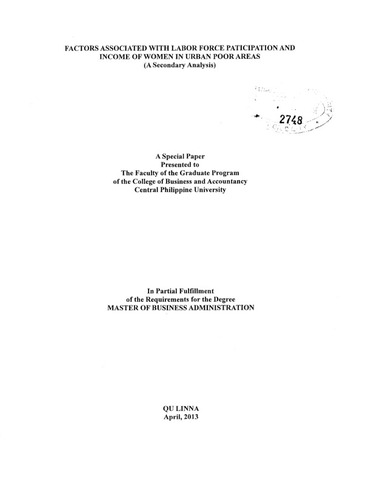Factors associated with labor force participation and income of women in urban poor areas (a secondary analysis)
| dc.contributor.adviser | David, Fely P. | |
| dc.contributor.author | Linna, Qu | |
| dc.date.accessioned | 2021-02-09T07:35:48Z | |
| dc.date.available | 2021-02-09T07:35:48Z | |
| dc.date.issued | 2013 | |
| dc.identifier.citation | Linna, Q. (2013). Factors associated with labor force participation and income of women in urban poor areas (a secondary analysis) (Unpublished Master's special paper). Central Philippine University, Jaro, Iloilo City. | en_US |
| dc.identifier.uri | https://hdl.handle.net/20.500.12852/245 | |
| dc.description | Abstract only | en_US |
| dc.description.abstract | The stability and growth of a country's economy hinges on its ability to produce goods and services for both domestic and international use. Labor represents an important elements of production, hence, the improvement of the quality of the labor force and efforts to make that more productive and responsive to growth are necessary for the development of the economy. A clear knowledge and understanding of the size, composition and other characteristics of this segment of the population is a big step in this direction. A continuing supply of data on labor force is indispensable to national as well as regional planning. A secondary analysis of the data culled out from the data file on a survey conducted by Dr. Fely P. David of the Social Science Research Institute (SSRI) and Panay Power Corporation (PPC) was made. The study entitled “Socio- Economic and Public Health Survey in Nineteen Barangays in the vicinity of the Diesel and Coal-Fired Power Plant in Iloilo City” is one among the series of surveys conducted by Central Philippines University-SSRI since 2001. All the 2880 women in the household aging 15 and up were chosen as cases for this study. Since the study utilized a secondary data analysis, the generated data of women of more than 15 years old in the household were separated from the main data file, taken and considered as the study population. This study was pursued to describe and determine the factors associated with the labor force participation and income of women in Urban Poor area in Iloilo, the Philippines. In business, organizations as establishment, government or private companies would also consider more about women’s labor participation when they doing human resource management. By knowing the labor participation of women, business administrator could provide more business opportunities for women. For establishment or organization that provide work opportunities for women, this study can provide information as to possible sources of labor. Moreover, the findings of this data analysis may be able to fill the need to update existing data on women labor force participation rate and income, particularly on the factors pushed women in to working and not working. | en_US |
| dc.format.extent | xi, 71 leaves | en_US |
| dc.language.iso | en | en_US |
| dc.subject.ddc | GSL Theses 650.072 L649 | en_US |
| dc.subject.lcsh | Employees | en_US |
| dc.subject.lcsh | Working class women | en_US |
| dc.subject.lcsh | Income | en_US |
| dc.subject.lcsh | Labor supply | en_US |
| dc.subject.lcsh | Working class--Economic conditions | en_US |
| dc.subject.lcsh | Working class | en_US |
| dc.subject.lcsh | Urban poor | en_US |
| dc.title | Factors associated with labor force participation and income of women in urban poor areas (a secondary analysis) | en_US |
| dc.type | Special paper | en_US |
| dc.description.bibliographicalreferences | Includes bibliographical references | en_US |
| dc.contributor.chair | Crucero, Teresita E. | |
| dc.contributor.committeemember | Monsole, Gilda C. | |
| dc.contributor.committeemember | Sansing, Acquiles S. | |
| dc.contributor.department | School of Graduate Studies | en_US |
| dc.description.degree | Master in Business Administration | en_US |
| local.subject | Social Science Research Institute (SSRI) | en_US |
| local.subject | Panay Power Corporation (PPC) | en_US |


